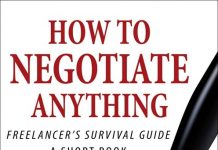 The quality issue is often brought up as one of the biggest drawbacks to the rise of independent/self-publishing. “There’s so much slush, how do you find the fraction of percent of books that are actually worth reading?” However, in her latest blog post, Kristine Kathryn Rusch points out that this may be the wrong question.
The quality issue is often brought up as one of the biggest drawbacks to the rise of independent/self-publishing. “There’s so much slush, how do you find the fraction of percent of books that are actually worth reading?” However, in her latest blog post, Kristine Kathryn Rusch points out that this may be the wrong question.
Rusch points out that a lot of commercially-published books aren’t so hot either, but in terms of finding books you want to read, it’s really beside the point. Hundreds of thousands of books are published by traditional publishers every year, and even if we assume that every one of those is top-notch, you’re never going to get around to reading more than a fraction of a percent of those—and probably most of the ones you do read will not be right when they’re published, but when you run into them years later on a library or bookstore shelf, or because a friend or “you might also like…” algorithm recommended them to you.
Since some of you will ask rather than figure this out for yourself, how do readers rise above that mountain of crap (um, I mean quality) to find the book they want? The way they always have—word of mouth, then by author, by the cover, and so on. (I linked to the studies on how people by books in my post on Promotion which you can find here.)
Then Rusch addresses the question of whether the services of a professional publisher are required to turn out a quality book, or whether the services self-publishing authors can contract for themselves are good enough.
As far as editing goes, she points out that a lot of professional publishing editors didn’t have any sort of training in it—they learned by doing, so to speak. And expecting quality editing from a publisher may be a mistake.
Editing isn’t a dying art. It’s a rarely practiced art. Over the past twenty years, many of my traditionally published books got a quick read from their editors and no revision request at all. Not a touch-up, not a word. My indie published sf novels will have more editing on them than they ever would have gotten from the editors in a traditional publishing house.
As for copy editing, proofreading, and graphic designing, Rusch points out, there are plenty of professionals who don’t work for big publishing houses and are just as good at their work as anyone who works for one of the New York publishers. They’re in every community, since every community has its own local newspapers and other media that require their services. And they work cheaper than the ones in New York, since they don’t have to pay the New York cost of living.
And, Rusch notes, sales and promotion staff at publishers don’t tend to do all that much sales or promotion outside of talking to other people in the book trade.
I can do everything that the traditional publishing companies I’ve worked with have done on sales over the past 20+ years—and I can do it better if I so chose (and I probably will chose in the next two or three years). I care, for one thing. For another, I’m not just going to market to the book trade.
What publishers have, Rusch says, is huge amounts of money, which they will lavish on their best-selling writers because those are the ones who make them the most money. But the midlist writers who make up the majority of a publisher’s stable can do for themselves everything that their publisher will do for them if they’re willing to put in the effort.
All in all, Rusch says, it’s easier to find “quality” books now than it has ever been, thanks to the rise of search engines, recommendation algorithms, reviews, book recommendation sites, and other Internet resources that have sprung up expressly to connect people with books they’ll love. And it’s easier to publish quality books, too.
And who decides if a book is “quality,” anyway? It’s the people who read it. If they like it, they’ll recommend it and buy more like it, and so will the people they recommend it to. They won’t care who published it.
Readers find quality books in the mountains of crap, and have done so for more than a hundred years. The arrival of indie publishing on the scene will not change how readers find their books. It will only change how some authors publish their books.
And that’s not the same thing. It’s not the same thing at all.
All the same, the quality attitude problem persists. I have a friend who refuses to read any self-published books because he already has a huge backlog of traditionally-published books to read, and he doesn’t want to take a chance on wasting his time on something self-published that might be of poor quality.
I think that’s kind of a pity, as there are a lot of great self-published books I would like to recommend to him. Perhaps someday he’ll change his mind.

































I agree wholeheartedly. I rarely read traditionally published books anymore, and those I do are backlist sales. Frankly, most of the books that are poorly edited and proofread are from traditional publishers who do a quick OCR and throw it out there. Self-published authors know they represent themselves and they know that a poor job will harm their reputation and sales.
Looking at the sales, like the current crop from Bloomsbury/Walker, and you’ll see that most of them have mediocre ratings which I would guess is the reason for their sale. I can certainly find much higher quality ebooks from self-published authors, indies and backlists.
People who think that books are good only if they also have a hardback version at Barnes & Noble are missing out.
I am among those who rarely venture into the waters of self-published books, for the same reason as the blogger’s friend: I have literally years of traditionally published books to get through (even of my current rate of 125+ books per year). But even if I didn’t, I’d try to find older traditionally published books before hitting the self-published works.
The traditionally published book has a big advantage over self-published in that I ***know*** that at least one person (other than the author) has read the book and believes that it might appeal to others. And they’re putting their money where their opinions are.
Also, I read very, very little genre fiction, which is where most of the self-publishing action seems to be. I’m reading what is typically classified as literary fiction, or non-fiction.
I’m not purchasing based on price (ever), and for me, books and authors are not fungible. I know I can’t find every good book published (or even a small proportion of them), but I believe my strategy will result in a higher quality reading experience than wading around in the slush pile and/or relying on the opinion of unknown reviewers whose only taste is in their mouths. Will I miss gems? You bet.
John, live a little. You don’t need to buy self-pubs to try them: just download the free sample.
Indeed, you are missing out on gems.
Thank you for sharing your insight on this topic. I have heard various tales on how traditional was better than self-publishing. And thank you for making the points about quality. My self-published book will be completed by Friday and this information was right on time.